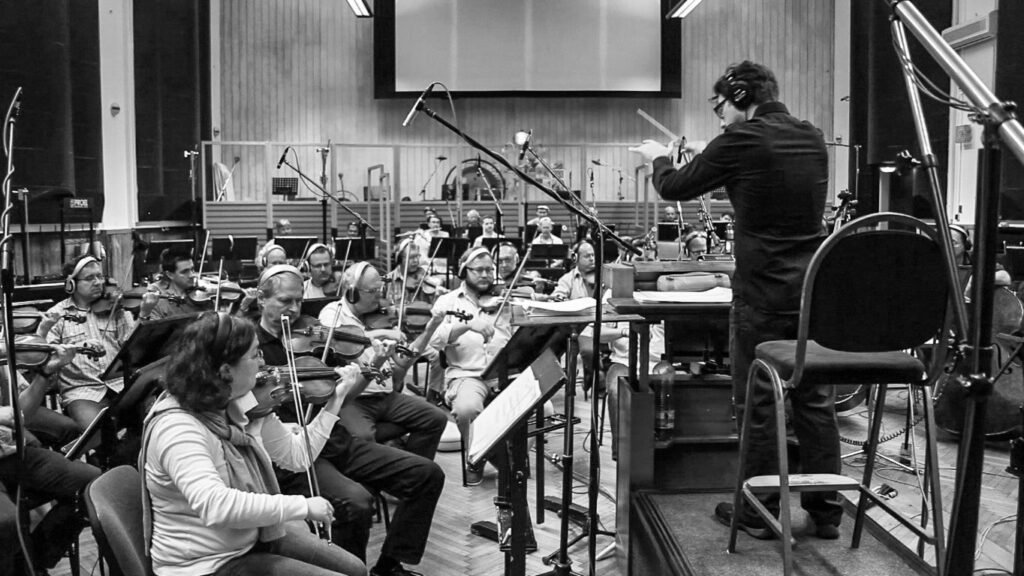Film music composition involves a number of steps, including understanding the story and its emotional arc, creating themes for characters and events, and writing music that enhances the visuals and dialogue on screen. While not a complete guide, the following article will give you a useful overview of the style, skills, and education you will need.
Table of Contents
Music composition for film and TV is a collaborative process. The composer will typically work closely with the director and other members of the film crew to ensure that the music supports and enhances the overall storytelling. This often involves writing music in advance of filming, and then adjusting and refining it as the film is edited. Additionally, many film composers will work with a music editor to ensure that the music is synced up perfectly with the on-screen action.

Breaking Down Film Scoring Techniques: A Mark Slater Perspective
As Mark Slater puts it, “Scoring techniques in film music are like the colors on an artist’s palette. It’s all about how you use and combine them that makes your composition unique and captivating.”
The process of scoring, at its core, is about translating the emotional beats of a scene into musical language. Here are some of Slater’s key insights on this intricate craft:
Dialogue Scoring
When it comes to scenes heavy with dialogue, Slater suggests being subtle and mindful. “The music should never overshadow the speech. Instead, it should act as an emotional undercurrent, subtly guiding the viewer’s response.” He advises using sparse instrumentation and avoiding complex musical ideas that could distract the viewer.
The Power of Silence
While music contributes tremendously to the cinematic experience, Slater maintains that silence can be just as powerful. “Knowing when not to compose can be as important as knowing what to compose”, he explains. Silence can create suspense, signal a turning point, or emphasize a moment, making its mindful use an essential skill for every aspiring composer.
Leveraging Leitmotifs
One technique that Slater often employs is the use of leitmotifs or recurring musical themes. These can be associated with a character, place, or idea, and when used effectively, can enhance the narrative and elicit an emotional response from the audience. “It’s like having a secret language between you and the audience”, Slater adds.
Respecting the Genre
Lastly, Slater emphasizes the importance of respecting the genre of the film. “Each genre has its own musical conventions and expectations. Familiarize yourself with them, and use them to your advantage to intensify the viewing experience”, he advises. However it is hard to define specific rules. The thriller has multiple sub-genres and the music approach also varies depending on the point of view of the director, the main themes of the story and the strength of the protagonist.
Despite these insights, it’s up to you, the aspiring film composer, to experiment, learn, and create your own unique musical narratives for the world of cinema.
Mark Slater conducts the Prague Metropolitan Orchestra at Smecky Studios.
Beginning Your Journey in Film Music Composition
Just like a painter needs a vast array of brushes, paints, and canvases to create a masterpiece, does a film composer not require a certain toolbox to translate their musical vision onto the silver screen? Of course. Your journey into film music composition will be smoother and more productive with these essential tools in tow.
Music Production Software
A Digital Audio Workstation (DAW) is the canvas where you’ll paint your auditory pictures. This software enables you to record, edit, and mix multiple tracks of audio. Whether it’s Logic Pro, Ableton Live, or Pro Tools, find the DAW that suits your workflow and becomes an extension of your creativity.
Virtual Instruments
Your DAW will need something to play, and that’s where virtual instruments come in. They are software interpretations of real-world instruments, letting you bring a full orchestra—or any imaginable sound—to your home studio. Mark Slater himself has often highlighted the importance of having a rich library of high-quality virtual instruments to add depth and texture to your scores.
Musical Keyboard
A musical keyboard is your bridge to the digital world, allowing you to perform your ideas directly into your DAW. It doesn’t have to be a grand 88-keys instrument; a compact, budget-friendly model will do just fine to get started.
Audio Interface and Studio Monitors
Lastly, capturing high-quality audio and accurately monitoring your mix are critical. An audio interface is a device that converts analog signals into digital audio information that your computer can process. Simultaneously, excellent studio monitor speakers will enable you to hear your work as it’s meant to be heard.
Remember, these tools are just the beginning. Film scoring is a constantly evolving industry with technological advancements, and as a composer, you need to be on your toes, understanding and mastering these changes. The best part is, most of these tools are available at varying price points, making it possible for anyone with passion and persistence to kickstart their film scoring journey.
Career Growth and Opportunities in Film Music Composition
Emerging in the film scoring realm requires more than just talent; it calls for a specialized education and practical experience. Many educational institutions offer degree programs and courses in music composition, theory, orchestration, and digital technology. Some well-known schools, such as Berklee College of Music and Juilliard School of music and performing arts, even provide specific courses in film scoring. In these programs, you not only hone your composing abilities but also gain a deep understanding of synchronization, timing, and the interaction of visuals and music in storytelling.
Yet, education isn’t solely about earning a degree. Continuous learning is quintessential. Attend seminars, workshops, and masterclasses by established composers. They can offer unique insights into their creative processes, unravelling the peculiarities of the craft you can’t find in textbooks.
Moreover, nothing matches the practical experience. Interning or assisting established composers can offer an invaluable, up-close view of the film scoring world. It’s a great opportunity to observe, learn, and participate in real-world projects under professional guideluines. While working with established composers, you’ll be exposed to the nuances of creativity, collaboration, and technical mastery involved in scoring a film. This type of mentorship often provides the foundation for one’s composing style and approach.
Remember, entering the film scoring industry doesn’t often happen overnight; it’s a journey strewn with continuous learning, practice, and patience. As a freelancer, networking is essential to find work and the field is highly competitive. However, the right education, coupled with practical experience, can go a long way in shaping your film scoring career.


